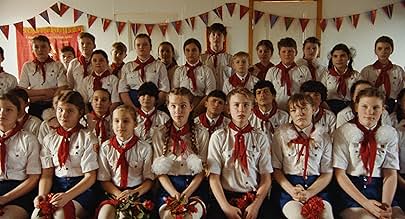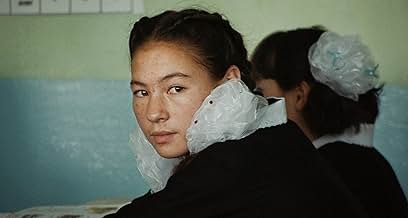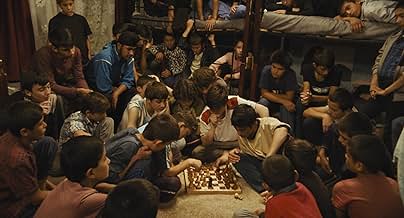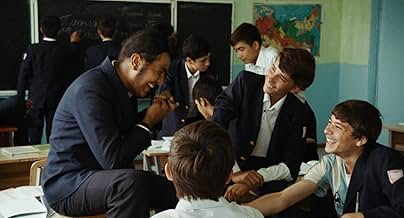NOTE IMDb
6,6/10
702
MA NOTE
Un revendeur de billets âgé de 15 ans à Kaboul rêve de Bollywood jusqu'à ce que les Soviétiques le forcent à entrer dans un orphelinat.Un revendeur de billets âgé de 15 ans à Kaboul rêve de Bollywood jusqu'à ce que les Soviétiques le forcent à entrer dans un orphelinat.Un revendeur de billets âgé de 15 ans à Kaboul rêve de Bollywood jusqu'à ce que les Soviétiques le forcent à entrer dans un orphelinat.
- Réalisation
- Scénario
- Casting principal
- Récompenses
- 1 victoire et 7 nominations au total
Avis à la une
Innovative and delicate film on the lives of poor boys in Afghanistan who have been sent to an orphanage. Through their eyes spectator sees dramatic changes in Afghanistan, from Soviet influence until the emergence of religious fundamentalism. The movie does not avoid the serious particular problems of each moment. Besides the social and political issues, I shall also highlight that the main character among those boys used to illegally re-sell movie theatre tickets, and loves cinema. Therefore, one of the most special elements of the film is how, during harsh episodes, his mind brings back the Bollywood scenes he loves in a way of making reality nicer and softer in a day-dreaming illusion.
The film is about a kid named Qodratullah who is forced to live in an orphanage by the pro-Soviet government of Afghanistan in 19189 Kabul. As soon as he arrives in the orphanage which is around 10-15 minutes in, the director lifts her focus and camera from the kid and tries instead to capture every elements in that place such as the kids, the dorms, the teachers and supervisers and so on.
This film is made based on unpublished diaries of Mr. Anwar Hashimi who also stars in this film and he lived in such a place for 8 years when he was a teenager. As a result, the main focus and star of this film is the mentioned orphanage and director Shahrbanoo Sadat reflects on Afghans culture and the country's political state at that time period as a subplot to the life in the orphanage.
The filmmakers have done their best to give us a human, sans cliche film and they have pretty much succeeded doing so. If you've got a chance to see this piece, don't miss it.
This film is made based on unpublished diaries of Mr. Anwar Hashimi who also stars in this film and he lived in such a place for 8 years when he was a teenager. As a result, the main focus and star of this film is the mentioned orphanage and director Shahrbanoo Sadat reflects on Afghans culture and the country's political state at that time period as a subplot to the life in the orphanage.
The filmmakers have done their best to give us a human, sans cliche film and they have pretty much succeeded doing so. If you've got a chance to see this piece, don't miss it.
Wonderful, a six-handed production (countries) that social criticism we love, bathing in history, a sad time the takeover of Afghanistan by the Soviets, called the War in Afghanistan (1979-1989), and the outcome, the film, could not to be different, the tragedy, the sadness, the defeat, and the interrupted ending, of the unspoken drama...
The Orphanage is a stellar film conveying the need for true heartfelt cinematic experiences. Beautiful cinematography creates a transcendent movie experience, with a script based on the unpublished diaries of Anwar Hashim, who plays a supporting role in the film. Acclaimed director Shahrbanoo Sadat uses personal experiences to convey an uplifting message.
Wolf and Sheep, the prequel to The Orphanage, premiered in 2016. Like its predecessor, The Orphanage is based on real life experiences in Afghanistan. The movie chronicles the main character, Qodrat (Qodratollah Qadiri), who spends his days trying to survive by illegally selling overpriced movie tickets and key rings. He is then brought to a Russian-operated orphanage along with other teenage boys, where he is given the opportunity to get an education alongside his peers. The Orphanage details his experiences in the orphanage and how the quarrels between roommates of the dorms are dealt with by the director Anwar (Anwar Hashimi). All throughout a war torn country in 1989, Qodrat remains hopeful, through fantasy sequences shared with the audience.
The cinematography is what truly stands out in this film. Directory of photography, Virginie Surdej captures the beauty of the country while adding to the heartbreaking story. My favorite part of this movie is the performances by the young people, including Qodratollah Qadiri, who gives rare insight into real life in Afghanistan, as they are all natives of the country.
The message of this film is about the importance of hope, despite all circumstances. The protagonist, Qodrat, remains hopeful and looks for positive routes of escapism throughout his struggles of growing up without a family, and his struggles at the orphanage. You should be aware that the film contains strong language and minor adult content. There are also two graphic descriptions of war and violence. There is also some references to sex and pornographic images (very far away from the screen, but still visible) that are unsuitable for younger kids.
I give The Orphanage 4 out of 5 stars and recommend it for ages 15 to 18, plus adults. Reviewed by Erin M., KIDS FIRST!
Wolf and Sheep, the prequel to The Orphanage, premiered in 2016. Like its predecessor, The Orphanage is based on real life experiences in Afghanistan. The movie chronicles the main character, Qodrat (Qodratollah Qadiri), who spends his days trying to survive by illegally selling overpriced movie tickets and key rings. He is then brought to a Russian-operated orphanage along with other teenage boys, where he is given the opportunity to get an education alongside his peers. The Orphanage details his experiences in the orphanage and how the quarrels between roommates of the dorms are dealt with by the director Anwar (Anwar Hashimi). All throughout a war torn country in 1989, Qodrat remains hopeful, through fantasy sequences shared with the audience.
The cinematography is what truly stands out in this film. Directory of photography, Virginie Surdej captures the beauty of the country while adding to the heartbreaking story. My favorite part of this movie is the performances by the young people, including Qodratollah Qadiri, who gives rare insight into real life in Afghanistan, as they are all natives of the country.
The message of this film is about the importance of hope, despite all circumstances. The protagonist, Qodrat, remains hopeful and looks for positive routes of escapism throughout his struggles of growing up without a family, and his struggles at the orphanage. You should be aware that the film contains strong language and minor adult content. There are also two graphic descriptions of war and violence. There is also some references to sex and pornographic images (very far away from the screen, but still visible) that are unsuitable for younger kids.
I give The Orphanage 4 out of 5 stars and recommend it for ages 15 to 18, plus adults. Reviewed by Erin M., KIDS FIRST!
War in Afghanistan, lonely children and their hiding places - an orphanage and Hollywood movies where you can get away from the cruelty around.
Illustration by Christina CookThe Orphanage is the second film directed by Shahrbanoo Sadat. It was screened in the Directors' Fortnight section at the Cannes Film Festival. Last year's nominees for the European Film Awards including such films as And Then We Danced (directed by Levan Akin) and Oleg (directed by Juris Kursietis) were also featured in the above-mentioned Section at the 72nd Festival.
Shahrbanoo Sadat's works intend to create a chain which has to consist of 5 separate films. Undoubtedly, the films that have already been made appear to be interconnected. Despite this fact, they are not inseparable. Each film can be viewed as an independent and multifaceted work of art.
Qodrat, a young man who has lost his parents, is the protagonist of the film. He does not look like a tramp or an abandoned child trembling with fear. Qodrat is an entrepreneurial teenager who sells cheap key chains and, what is much more important, resells tickets for popular Bollywood movies at a triple price.
Watching Qodrat getting by, we also see war-ravaged Afghanistan where people sincerely love Indian movies.
When the Bollywood film is on, everyone is reverently watching yet another fight and even adult men dance to the beat of the vibrant music.
All of us associate Bollywood with different movies, be it a famous Seeta and Geeta comedy-drama film, or a modern musical drama film Gully boy. Yet, it is always bright, colorful and with a happy end.
All the turning points in The Orphanage are accompanied by the Bollywood movie excerpts, whose romantic nature not only helps to convey hopes and dreams of the heroes but also disguises their pain and frustration.
Being caught scalping the tickets, Qodrat is taken to an orphanage. There he meets the same children as he is. Children who were left alone; the ones who just want to live as the heroes of their favorite films being able to easily overcome obstacles, being strong and unpredictable.
However, the reality is different. The orphanage, as well as prison, has its own rules. There are different people who do not have much in common; people brought up cherishing different values.
Still, the boy manages to find real friends who he spends endless sunny days with. They have a roof above their heads and hot food. The residents of the orphanage do not think much about the outer world which exists outside their shelter. They live here and now - make friends, dream, learn and misbehave. Director Anwar, both strict and just, maintain harmony and order in the orphanage.
Even if you are just raising children, you cannot isolate yourself from the authorities and the war. You have to fit in, as the ones in power set the rules and responsibilities; they may support as well as punish. It is a heavy burden that lies on Anwar's shoulders.
When the children are being taken care of by the Soviet Union, they learn Russian and even have a chance to visit Moscow. When the Mujahideen come to power, the rules in the orphanage change accordingly - new ideology, new textbooks, the new context of existence.
The Orphanage is a film about lonely children whose world is destroyed by the war. Someone dies on the battlefield, someone stays in order to survive or just surrender a bit later.
Even if you are a child, war can turn you into an adult in a split second.
Shahrbanoo Sadat's works intend to create a chain which has to consist of 5 separate films. Undoubtedly, the films that have already been made appear to be interconnected. Despite this fact, they are not inseparable. Each film can be viewed as an independent and multifaceted work of art.
Qodrat, a young man who has lost his parents, is the protagonist of the film. He does not look like a tramp or an abandoned child trembling with fear. Qodrat is an entrepreneurial teenager who sells cheap key chains and, what is much more important, resells tickets for popular Bollywood movies at a triple price.
Watching Qodrat getting by, we also see war-ravaged Afghanistan where people sincerely love Indian movies.
When the Bollywood film is on, everyone is reverently watching yet another fight and even adult men dance to the beat of the vibrant music.
All of us associate Bollywood with different movies, be it a famous Seeta and Geeta comedy-drama film, or a modern musical drama film Gully boy. Yet, it is always bright, colorful and with a happy end.
All the turning points in The Orphanage are accompanied by the Bollywood movie excerpts, whose romantic nature not only helps to convey hopes and dreams of the heroes but also disguises their pain and frustration.
Being caught scalping the tickets, Qodrat is taken to an orphanage. There he meets the same children as he is. Children who were left alone; the ones who just want to live as the heroes of their favorite films being able to easily overcome obstacles, being strong and unpredictable.
However, the reality is different. The orphanage, as well as prison, has its own rules. There are different people who do not have much in common; people brought up cherishing different values.
Still, the boy manages to find real friends who he spends endless sunny days with. They have a roof above their heads and hot food. The residents of the orphanage do not think much about the outer world which exists outside their shelter. They live here and now - make friends, dream, learn and misbehave. Director Anwar, both strict and just, maintain harmony and order in the orphanage.
Even if you are just raising children, you cannot isolate yourself from the authorities and the war. You have to fit in, as the ones in power set the rules and responsibilities; they may support as well as punish. It is a heavy burden that lies on Anwar's shoulders.
When the children are being taken care of by the Soviet Union, they learn Russian and even have a chance to visit Moscow. When the Mujahideen come to power, the rules in the orphanage change accordingly - new ideology, new textbooks, the new context of existence.
The Orphanage is a film about lonely children whose world is destroyed by the war. Someone dies on the battlefield, someone stays in order to survive or just surrender a bit later.
Even if you are a child, war can turn you into an adult in a split second.
Le saviez-vous
- ConnexionsFeatures Shahenshah (1988)
Meilleurs choix
Connectez-vous pour évaluer et suivre la liste de favoris afin de recevoir des recommandations personnalisées
- How long is The Orphanage?Alimenté par Alexa
Détails
- Date de sortie
- Pays d’origine
- Langues
- Aussi connu sous le nom de
- L'orphelinat
- Lieux de tournage
- Allemagne(location)
- Sociétés de production
- Voir plus de crédits d'entreprise sur IMDbPro
- Durée1 heure 30 minutes
- Couleur
- Rapport de forme
- 1.85 : 1
Contribuer à cette page
Suggérer une modification ou ajouter du contenu manquant

Lacune principale
By what name was L'Orphelinat (2019) officially released in Canada in English?
Répondre















